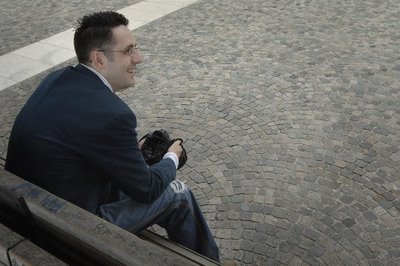"People are fond of spouting out the old cliché about how Van Gogh never sold a painting in his lifetime. Somehow his example serves to justify to us, decades later, that there is somehow merit in utter failure. Perhaps, but the man did commit suicide." -- Hugh Macleod,
How To Be Creative: 29. Whatever choice you make, The Devil gets his due eventuallyWell, this is quite funny, well done Hugh.
On the other hand, I think Hugh's main point is misses its target. For one thing, it is either uneducated or disingenuous to hint that Vincent committed suicide because he was not selling well. If you read about him, it was clear that while he had existential angst out the wazoo, he was happy if he just had food and paint.
For another thing, if Vincent was actually a "failure" would anybody be using him as an inspiration? They use him because he was one of the biggest successes fine art has ever produced, only he died too young to see it happen. So the example is not "merit in utter failure", but merit in being highly successful even if it has not happened yet.
You can also see Vincent as an example of somebody who saw the bigger picture. Sure, he was agonizing about not being able to live the "real life" as he called it, with family, house, money, and respectability... and yet his art was so important to him that he sacrificed all that for it. And the world is much richer for it.
-----
Anyway, looking this up, I see that
Hugh is being a bit quoted out of context on Quoteoftheday. His full point is more complex. (Or less clear...) Lo: (like usual, italics is quoted text)
"29. Whatever choice you make, The Devil gets his due eventually.
Selling out to Hollywood comes with a price. So does not selling out. Either way, you pay in full, and yes, it invariably hurts like hell.
People are fond of spouting out the old clich about how Van Gogh never sold a painting in his lifetime. Somehow his example serves to justify to us, decades later, that there is somehow merit in utter failure.
Perhaps, but the man did commit suicide. The market for his work took off big-time shortly after his death. Had he decided to stick around another few decades he most likely wouldve entered old age quite prosperous. And sadly for failures everywhere, the clich would have lost a lot of its power.
The fact is, the old clichs work for us in abstract terms, but they never work out in real life quite the same way. Life is messy; clichs are clean and tidy.
Of course, there is no one true way. Whether you follow the example of fame-and-glamor Warhol or poor-and-miserable Van Gogh doesnt matter in absolute terms. Either extreme may raise you to the highest heights or utterly destroy you. I dont know the answer, nor does anybody else. Nobody but you and God knows why you were put on this Earth, and even then
So when a young person asks me whether its better to sell out or stick to ones guns, I never know what to answer. Warhol sold out shamelessly after 1968 (the year he was wounded by the gunshot of a would-be assassin) and did OK by it. I know some great artists who stuck to their guns, and all it did was make them seem more and more pathetic.
Anyone can be an idealist. Anyone can be a cynic. The hard part lies somewhere in the middle i.e. being human."
-- Hugh Macleod

















